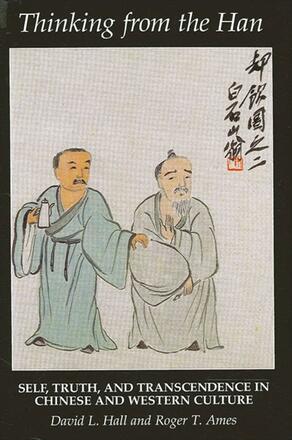
Thinking from the Han
Self, Truth, and Transcendence in Chinese and Western Culture
Alternative formats available from:
Examines the issues of self (including gender), truth, and transcendence in classical Chinese and Western philosophy.
Description
This book continues a comparative project begun with the authors' Thinking Through Confucius and Anticipating China. It continues the comparative discussions by focusing upon three concepts--self, truth, transcendence--which best illuminate the distinctive characters of the two cultures. "Self" specifies the meaning of the human subject, "truth" considers that subject's manner of relating to the world of which it is a part, and "transcendence" raises the issue as to whether the self/world relationship is grounded in something other than the elements resourced immediately in self and world. Considered together, the discussions of these concepts advertise in a most dramatic fashion the intellectual barriers currently existing between Chinese and Western thinkers. More importantly, these discussions reformulate Chinese and Western vocabularies in a manner that will enhance the possibilities of intercultural communication.
David L. Hall is Professor of Philosophy at the University of Texas at El Paso. He is the author of The Civilization of Experience: A Whiteheadian Theory of Culture; The Uncertain Phoenix: Adventures Toward a Post-Cultural Sensibility; and Eros and Irony: A Prelude to Philosophical Anarchism. With SUNY Press, Professor Hall is coauthor of Thinking Through Confucius (with Roger T. Ames); and Anticipating China (with Roger T. Ames); author of The Arimaspian Eye and Richard Rorty: Prophet and Poet of the New Pragmatism. Roger T. Ames is Professor of Philosophy at the University of Hawaii and editor of Philosophy East and West. He is the author of The Art of Rulership: A Study in Ancient Chinese Political Thought and coeditor of Nature in Asian Traditions of Thought: Essays in Environmental Philosophy (with J. Baird Callicott); Self and Deception: A Cross-Cultural Philosophical Enquiry (with Wimal Dissanayake); Self as Body in Asian Theory and Practice; and Self as Person in Asian Theory and Practice (both with Wimal Dissanayake and Thomas Kasulis), all published by SUNY Press. He is also the translator of Sun-tzu: The Art of Warfare; and Sun Pin: The Art of Warfare (with D. C. Lau).
Reviews
"I especially like the book's clarity of presentation and its attempt to address the way in which contemporary Westerners are likely to misunderstand the Chinese. The way the book draws attention to the practical effects that the different philosophical backgrounds of China and the West have on our current efforts at cross-cultural dialogue is extremely timely and gives life to the philosophical ideas considered.
"The discussion of Chinese approaches to gender issues is fascinating, and it represents a real contribution to gender theory. The clarification of the way in which Chinese thought does and does not correspond to deconstructionist outlooks is helpful and surprising. The discussion of Daoism's use of humor is both delightful and seriously important for scholars of either tradition and the discussion of the li in relation to human rights is extremely helpful for ethical thought. " -- Kathleen Higgins, The University of Texas at Austin